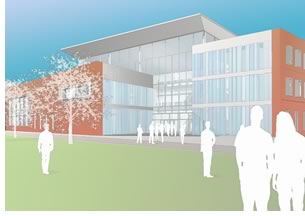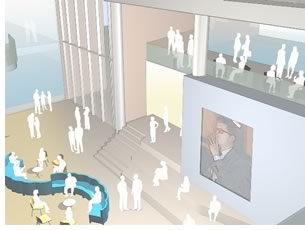

10/2005
by Tracy Ostroff
SmithGroup is designing the new James Lee Sorenson Language and Communications Center (SLCC) at Washington D.C.’s Gallaudet University, one of the world’s leading institutions for the deaf and hard of hearing. Through the fascinating design process, says SmithGroup’s Tom Butcavage, the team is focusing on a heightened visual experience or “visu-centric” design for the Gallaudet community.
 “The Sorenson Center is intended as a true landmark, and will
occupy an important site on this historically and architecturally significant
campus,” says Butcavage, SmithGroup’s lead designer for the
project. “It really is a great design opportunity.” The building
will take its place in one of Gallaudet’s two main quads. The campus
does not have a detailed master plan, but the thought is to connect the
building with a major campus walk that also links up with the primary
and secondary schools on the university grounds.
“The Sorenson Center is intended as a true landmark, and will
occupy an important site on this historically and architecturally significant
campus,” says Butcavage, SmithGroup’s lead designer for the
project. “It really is a great design opportunity.” The building
will take its place in one of Gallaudet’s two main quads. The campus
does not have a detailed master plan, but the thought is to connect the
building with a major campus walk that also links up with the primary
and secondary schools on the university grounds.
The 83,000-gross-square-foot academic teaching and research facility will include classrooms, laboratories, clinics, libraries, and office space. Departments housed in the new Center will include American Sign Language and Deaf Studies, and Hearing, Speech, and Language Sciences.
What’s particularly interesting about this building, Butcavage explains, is that it will bring together American Sign Language, the language of Gallaudet’s campus, with research on assistive-hearing technologies in the speech and language labs. The two concepts haven’t always coexisted. For example, he says, at one point sign language was forbidden with the idea of encouraging the deaf to read lips and speak. While that approach is no longer in force, the new space for interdisciplinary research promises to bridge American Sign Language with research in assistive hearing devices, such as cochlear implant technology.
“Visu-centric design”
The team is just embarking on the design development phase. SmithGroup
is taking cues from nature and the organic experience. “Most
of the other buildings on campus are massive and inward looking. This
structure is transparent.” Butcavage says that before they were
brought in, the architect brother of a Gallaudet professor was helping
to establish design principals with the idea of visu-centric design,
a term new to the SmithGroup planners. Combining the two concepts,
the team looked at images of nature. For example, aerial views of rivers
informed the way they configured the main circulation path. That geometry
allows for more gentle angles at corners to make it easy for deaf people
to move through the building.” The project will be LEED™-rated,
consistent with “careful manipulation of natural elements,” Butcavage
says.
 “The idea of the building being organic translates into it being
natural and easy to use. It bridges the idea of the deaf state of being
as a natural and organic experience.” The SmithGroup team is excited
about the many layers of meaning and the idea of taking on an architecture
project that is so much about a heightened visual experience. SmithGroup’s
team also includes Lori Cappuccio, lead designer on the project; lighting
designer Rodrigo Manriquez, of SmithGroup; and acoustic consultant Cavanaugh
Tocci.
“The idea of the building being organic translates into it being
natural and easy to use. It bridges the idea of the deaf state of being
as a natural and organic experience.” The SmithGroup team is excited
about the many layers of meaning and the idea of taking on an architecture
project that is so much about a heightened visual experience. SmithGroup’s
team also includes Lori Cappuccio, lead designer on the project; lighting
designer Rodrigo Manriquez, of SmithGroup; and acoustic consultant Cavanaugh
Tocci.
Specialized expertise
Joining the SmithGroup design team is George Balsley, a deaf architect
from Amherst, Mass., who will offer special expertise to ensure that
the architectural, lighting, acoustic, and audiovisual aids are supportive
of a deaf design environment. Deaf-friendly elements incorporated into
the building’s design will include diffused lighting that is
not glaring, powerful speaker systems to encourage reverberation, telephone
access technologies such as video and text relay services, closed captioning,
and open flexible classrooms to facilitate visual access. Balsley also
helps ease communication and offers fresh input.
In November 2004, Sorenson Media and the Sorenson Legacy Foundation donated $5 million to Gallaudet University to create the Sorenson Language and Communications Center. The Sorenson Center will also include Sorenson video phone booths, an exhibit component with a timeline of deaf history, and a clinic for the public.
“We are very impressed with SmithGroup’s clear understanding of the new building’s purpose,” said Dr. Jane Fernandes, Gallaudet University provost. “We look forward to working with them to construct a state-of-the-art facility for the deaf and hard of hearing people.” Butcavage praised the client’s engagement with the architectural design team, calling it “focused and engaging.” The building is scheduled to start construction next June, with completion targeted for November 2007.
Copyright 2005 The American Institute of Architects.
All rights reserved. Home Page ![]()
![]()
 |
||
Founded in 1864 in Washington, D.C., Gallaudet University is the world’s only university in which all programs and services are specifically designed to accommodate deaf and hard of hearing students. Today, deaf and hard of hearing undergraduate students can choose from more than 40 majors leading to a Bachelor of Arts or a Bachelor of Science degree. A wide array of Masters and doctoral programs are also offered to deaf, hard of hearing, and hearing graduate students.
|
||